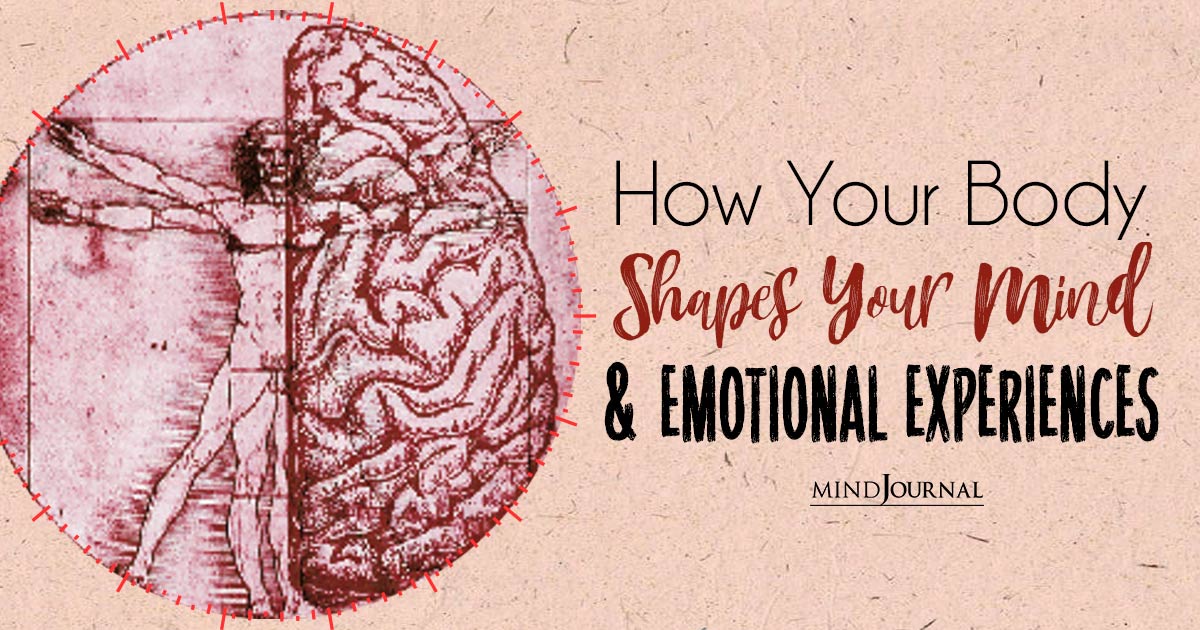Have you ever wondered how your body and mind are interconnected? How the physical sensations you experience can shape your thoughts and emotions? It turns out that our bodies play a crucial role in shaping our cognitive processes and emotional experiences. This fascinating phenomenon is known as embodied cognition.
Today, we will explore the concept of embodied cognition, the profound mind and body connection, and how the body affects the mind and emotions.
So, let’s dive into the captivating world of embodied cognition and uncover the secrets of how your body shapes your mind and emotional experiences.
Embodied Cognition: Understanding the Concept
Embodied cognition is a revolutionary theory that challenges traditional views of cognition by emphasizing the fundamental role of the body in shaping our thoughts and experiences.

Rather than considering the mind as an isolated entity, embodied cognition recognizes that our cognitive processes are deeply intertwined with our bodily experiences. It suggests that our physical sensations, movements, and interactions with the environment actively contribute to our understanding of the world.
Mind and Body Connection: A Dynamic Dance
The mind and body connection is a dynamic dance, where each partner influences and shapes the other. Our bodies provide the foundation upon which our minds build experiences and make sense of the world.
For example, think about how your body reacts when you’re feeling anxious—your heart may race, your palms may sweat, and your muscles may tense. These bodily sensations are not separate from your mental state; they are an integral part of it.
Your body’s response influences your thoughts and emotions, creating a feedback loop between your mind and body.
The Body’s Influence on Perception and Understanding
Our bodies play a crucial role in our perception and understanding of the world around us. Through our senses, we gather information about the environment, and our bodies interpret and make sense of that information.
For instance, research has shown that physical warmth can lead to feelings of social warmth and generosity. Holding a warm cup of coffee can make us perceive others as more friendly and trustworthy.
These findings highlight how our bodily experiences shape our perception and understanding of social interactions.
Embodied Emotions: The Power of Bodily Sensations
Emotions are not just experienced in our minds; they are also deeply embodied. Our bodily sensations provide the foundation for emotional experiences.
When we feel happy, our bodies might feel light, and we may have a spring in our step. Conversely, when we’re sad, our bodies might feel heavy, and our movements may slow down. This is how the body affects the mind.
Related: Surprising Link Between Body and Feelings: James Lange Theory of Emotion Explained
By paying attention to our bodily sensations, we can gain a deeper understanding of our emotional states and learn to regulate them effectively.
The Role of Gesture and Action in Thinking
Have you ever found yourself using hand gestures while explaining something? It turns out that gestures are not merely expressive movements; they also play a significant role in our thinking processes.
Research suggests that gestures can enhance our understanding and memory of information. When we use gestures while explaining a concept, it helps us form a mental image and strengthens our connection to the information.
This phenomenon showcases how our bodily actions can shape our thinking and cognitive processes.
Embodied Cognition in Learning and Education
Embodied cognition has important implications for learning and education. By incorporating physical movements and sensory experiences into the learning process, we can enhance understanding and retention.
For example, studies have shown that students who engage in hands-on activities or simulations perform better on tests and have a deeper understanding of the subject matter. This approach recognizes that learning is not solely a mental activity but also a physical and experiential one.

The Influence of Body Posture on Cognitive Processes
Believe it or not, your body posture can impact your cognitive processes. Research has found that adopting an upright and open posture can improve attention, memory, and confidence.
On the other hand, slouching or adopting a closed-off posture can have the opposite effect. So, the next time you need a mental boost, sit up straight and open up your body to maximize your cognitive potential.
Related: Mind Body Dualism Theory: A Critical Analysis Of One Of Philosophy’s Greatest Debates
Embodied Metaphors: How Physical Experiences Shape Abstract Concepts
Embodied cognition suggests that our physical experiences shape our understanding of abstract concepts through metaphors. For example, we often use physical sensations to describe emotional states, such as feeling “light-hearted” or “heavy-hearted.”
These metaphors reveal how our bodily experiences are deeply intertwined with our understanding of abstract concepts. By leveraging these embodied metaphors, we can enhance our comprehension and communication of complex ideas.
Harnessing the Power of Embodied Cognition
Now that we understand the profound influence of embodied cognition, how can we harness its power in our daily lives? One way is through mindfulness practices that encourage us to pay attention to our bodily sensations and use them as anchors for present-moment awareness.
Additionally, incorporating physical movements, gestures, and sensory experiences into our learning and problem-solving can enhance our cognitive processes. By embracing the mind-body connection, we can tap into the full potential of embodied cognition and enrich our experiences.
Takeaway
Embodied cognition reveals the inseparable connection between our bodies and minds. Our physical sensations, movements, and interactions with the world actively shape our cognitive processes and emotional experiences.
By understanding and embracing the power of embodied cognition, we can gain a deeper understanding of ourselves and enhance our interactions with others.
So, let’s embark on this captivating journey of exploring the intricate relationship between our bodies and minds, and unlock the extraordinary potential of embodied cognition.
Related: The 11 Emotional Energy Centers In Our Body: The Mind-Body-Emotion Connection
Frequently Asked Questions (FAQs):
What are examples of embodied cognition?
Examples of embodied cognition include using physical gestures to enhance memory recall and associating warmth with social closeness.
What are the 4 E’s of embodied cognition?
The 4 E’s of embodied cognition are enactment, emulation, embodiment, and embeddedness, reflecting the integration of mind and body.
What is embodied cognition in psychology today?
Embodied cognition in psychology today explores how the body influences cognitive processes, emphasizing the interconnectedness of physical sensations and mental functions.










Leave a Reply